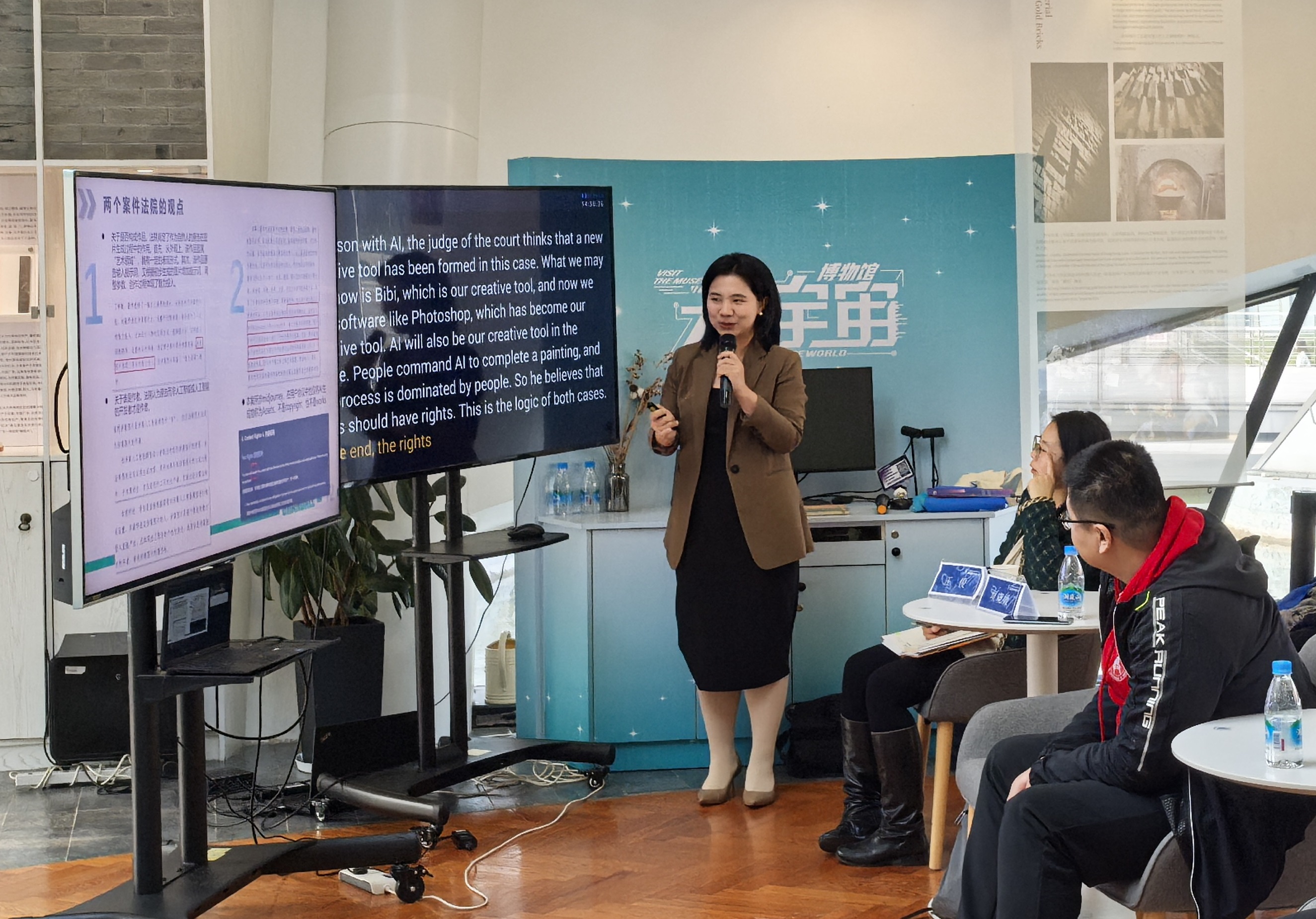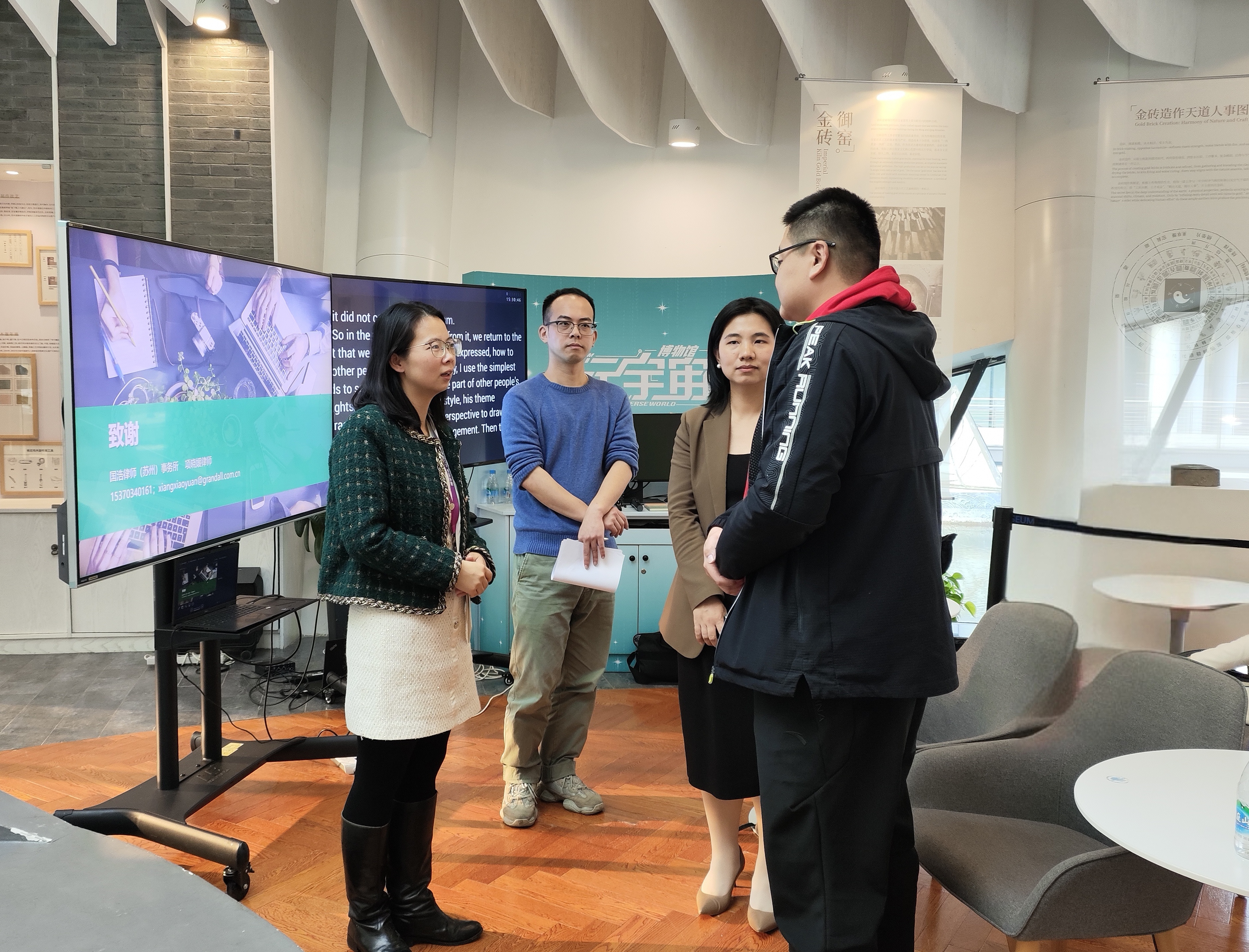With the rapid development of technology, artificial intelligence (AI) is changing our world at an unprecedented speed. In order to discuss the latest development and challenges of generative AI in the perspective of intellectual property (IP), the Intellectual Property Information Service Center (IPISC) of Xi'an Jiaotong-Liverpool University (XJTLU) successfully held the fourth session of the “IP Seminar” on the afternoon of November 21st, 2024. With the theme of “Generative Artificial Intelligence Technology and Intellectual Property”, the seminar attracted many students, faculty and enterprises.
在全球科技迅猛发展的今天,人工智能技术正以前所未有的速度改变着我们的世界。为了深入探讨生成式人工智能技术在知识产权领域的最新发展和挑战,西交利物浦大学知识产权信息服务中心于2024年11月21日下午成功举办了第四期“知产下午茶”活动。本次活动以“生成式人工智能技术与知识产权” 为主题,吸引了众多校内外的师生和企业人员参加。

At the beginning of the seminar, Ms. Wang Jun, the Team Leader of Library Academic Liaison and Reference Division, XJTLU, brought a topic titled “Patent Protection Trend and Future Impact of Generative AI”. Ms. Wang, with her rich experience in professional intelligence analysis, combined with the scientific research projects of XJTLU scholars on AI, explained in detail the development history of generative AI, the patent situation, and made an in-depth analysis of the future impact and challenges. She pointed out that the generative AI will have a significant impact on a wide range of industries, providing companies, organizations, and individuals with an unprecedented ability to generate data. However, there are concerns about the use of generative AI models and tools, including copyright infringement, potential misuse and the risk of job displacement.
活动伊始,由西交利物浦大学图书馆学术联络与参考咨询部主任王俊老师,带来了题为“生成式人工智能的专利态势与未来影响”的主题分享。王老师以其丰富的专业情报分析经验,结合西浦学者人工智能应用科研成果,详细解读了生成式人工智能的发展历程、专利态势,并对未来的影响和挑战进行了深入分析。她指出,生成式人工智能的出现将对各行各业产生重大影响,为公司、组织和个人提供了前所未有的数据生成能力。然而,对于日益增多的使用生成式人工智能模型和工具也存在担忧,这些担忧包括侵犯版权和潜在的滥用,工作置换的风险等。
Ms. Xiang Xiaoyuan, an intellectual property lawyer from Grandall Law Firm, shared the topic on “Copyright Risks of Generative AI”. Ms. Xiang explained the copyrightability of AI-generated content from a legal point of view based on the copyright theories of “idea–expression distinction” and “authorship”, and emphasized that “there is no creation without ideas; new ideas bring new expressions, but new expressions may not necessarily be accompanied by new ideas”. In addition, Ms. Xiang analyzed the ownership of copyright of AIGC based on two famous law cases in China, and pointed out that copyright, as an intangible property right, are justified on the basis of the fact that the right holder must be the author. Finally, Ms. Xiang explained in detail the determination of infringement constituted by the use of works, which helped audience to avoid potential copyright risks when using AI generated content.
随后,国浩律师事务所的知识产权律师项晓媛老师,就“生成式人工智能的版权风险”进行了分享。项律师从法律角度出发,回归“思想表达二分”和“作者身份”的著作权基础理论,阐述了人工智能生成内容的可版权性,她强调“没有思想,自然没有创作;新的思想,必然有新的表达,新的表达,未必有新的思想”。在分享中,项律师通过中国AIGC图片著作权第一案和第二案,多角度分析AIGC的著作权归属,她指出,著作权作为一种无形的财产权,其合理性依据在于权利人必须是作者。最后,项老师详细讲解了使用他人作品构成侵权的判定,帮助师生在使用人工智能生成物时避免潜在的版权风险。

The seminar not only provided participants with relevant knowledge, but also promoted exchange between those in university and IP professionals. IPISC will continue to work for IP promotion and training, provide better IP information services and support to students, faculty and industry, facilitating the development of sci-tech innovation and IP protection.
本次活动不仅为与会者提供了宝贵的知识盛宴,也促进了师生与知识产权从业者的深入交流。西交利物浦大学知识产权信息服务中心将继续致力于知识产权推广和培训,为师生和业界提供更加优质的知识产权信息服务和支持,推动科技创新和知识产权保护事业的发展。